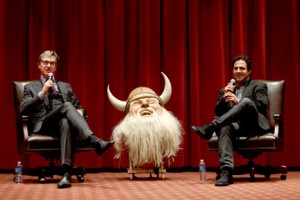Festival launches Comedy@SCA
The university held its inaugural Comedy@SCA festival Friday through Sunday, holding screenings and discussions that featured a variety of directors, producers, writers, show runners and actors.

Freaks and Geeks · Paul Feig (left) and Gabe Sachs graduated from the School of Cinematic Arts in 1984. During their discussion on Saturday, they talked about films they had made for their classes. - Photo courtesy of Caleb Cappola
The festival, hosted by the School of Cinematic Arts and Visions and Voices, was held to launch the first ever comedy concentration program, which will teach the technical side of creating comedic movies and television shows. Comedy@SCA will be directed by Jack Epps Jr., the School of Cinematic Arts Jack Oakie endowed chair in comedy and associate professor of writing; Barnet Kellman, professor of film and television production, and David Isaacs, a visiting professor of screenwriting.
Epps said USC was the only institution qualified to host the festival.
“These people, over a three-day period, coming together, meeting on such a broad range of comedy: I think it’s extremely unique,” Epps said. “And, that was our hope and wish for this [weekend], to create a comedy festival in Los Angeles through USC.”
Epps said there had never been a similar festival held in Los Angeles. He introduced the weekend’s first event, a discussion between ’84 alumnus and director Peter Segal and actor Steve Carell.
“It’s really never been done in Los Angeles and it’s really overdue,” Epps said. “Tonight is the christening for Comedy@SCA, USC’s effort to become the destination institution for students who are serious about comedy.”
Segal summarized the significance of the program’s launch more simply by saying, “It’s about f–king time.”
Eric Pratt, a sophomore majoring in writing for screen and television, said the caliber of the cinema school’s connections displayed by the event put him at ease.
“It’s great that they have all these big names in one weekend,” Pratt said. “It really shows what kind of connections the School [of Cinematic Arts] has because you see where alumni end up and how they got there. … It’s really encouraging as an aspiring screenwriter.”
Organizers said the festival is historically significant because of the initiative it kicks off.
Comedy@SCA will provide classes for a concentration that will be open to all students starting spring 2013. Epps said the courses will be at the 400-level, so graduate and undergraduate students in all areas of study can take the classes.
“Comedy doesn’t know its limits and is open to everyone, so it’s an initiative of embracing comedy at USC,” Epps said. “The Harvard Lampoon is open to all of Harvard, so this is USC’s place for comedy.”
Sarah Zahedi, a freshman majoring in broadcast and digital journalism, said she is excited the classes will be open to those outside the School of Cinematic Arts because she has an interest in the production side of comedy.
“It’d be great,” Zahedi said. “I’d love to take those classes and be able to get a lot of good advice from people who really know what they’re talking about.”
Paul Feig, creator of Freaks and Geeks and director of Bridesmaids, said the School of Cinematic Arts discouraged comedy when he was a student between 1982 and 1984.
“I wish they had [a comedy concentration] when I was here,” Feig said. “All of the movies I made when I was here were comedies and they were met with a lot of derision and skepticism because the film school was a very serious place back in my day.”
Feig called the creation of a comedy-focused program “long overdue.”
“It’s so smart to do this because comedy is difficult,” Feig said. “Drama and other works are difficult too, but comedy has its own unique challenges and you can’t learn about them from people who don’t do it. You need the perspective of people who have been in the trenches and done it before to tell people how to get it right.”
During his discussion with ’84 alumnus and writer/producer Gabe Sachs, Feig said these mistakes were vital in learning how to create comedy.
“You only get better at comedy by making a ton of mistakes and it’s great to learn from people who have already made those mistakes,” Feig said. “It’s not like you won’t make those mistakes yourself, but you’ll know [what they are].”
Roy Parker, a sophomore majoring in writing for screen and television, said he was comforted by Feig and Sach’s discussion.
“For me and a lot of people it’s like wow, they’re talking about 290 and 310, which are classes we take,” Parker said. “It puts me at ease because they’re talking about making crappy little movies just like I make crappy little movies, and now they’re making big movies with Kristin Wiig. It’s encouraging to know we can move on.”
Brandon Baer, a sophomore majoring in critical studies, said the Comedy@SCA program directors’ experience will guarantee students of the comedy concentration’s quality.
“With their credentials alone, you know the people spearheading this program know what they’re doing,” Baer said. “It’s not every day that your school does this. Other schools that don’t have the same people couldn’t pull this off.”
Epps said USC’s location will be vital in its ability to grow the program, just as it was vital in booking speakers for the festival.
Epps said the Comedy@SCA initiative resonated with the spirit of the university.
“It really represents what’s special at USC,” Epps said. “People want to be part of the many initiatives our university has. It shows the breadth of initiatives we have, whether it’s in the sciences or law or medicine or fine arts. It’s part of what makes USC special.”

Comments are closed.